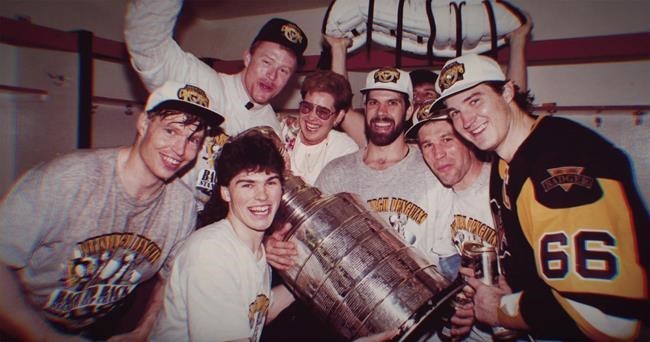Steven Warshaw walked up to Gabe Polsky and introduced himself.
The pair had just attended a 2015 screening of Polsky's documentary, "Red Army," which chronicles the rise of the Soviet Union's famed hockey program through the eyes of the country's greats.
"Steve was like, 'That was a great movie. But I've got this crazy story about the Red Army team and what happened in the 1990s,'" Polsky recalled in an interview with The Canadian Press. "I stopped him in his tracks, because after doing 'Red Army,' I didn't want to do anything close to Russia or hockey."
But Warshaw, who had worked for the owners of the Pittsburgh Penguins and was on the ground in Moscow after they formed a partnership with Russia's most successful club, persisted. He eventually mailed Polsky a box of contracts, documents and videos, but it got pushed to the side.
"My wife was cleaning out the house and said, 'I'm throwing this box away,'" Polsky continued. "I felt guilty so I started looking through it. I realized somebody's got to do this.
"This is the craziest story. Nobody knows about it."
The result is "Red Penguins," a funny, wild, unbelievable tale set to debut in Canada via streaming and on demand services next week that details an NHL franchise's attempt to break into Russia during the turbulent aftermath of the Soviet Union's collapse. The documentary, which Polsky wrote, produced and directed, and was featured at last year's Toronto International Film Festival, was scheduled for theatrical release earlier this summer before COVID-19.
"Russia was an enigma to all of us," Warshaw says early in the film. "What went on behind the Iron Curtain, nobody knew. And I wanted to know, so I went."
It wasn't what anyone, at least from a North American point of view, expected with the dramatic shift from communism to capitalism overnight. The arena was in shambles and many people were starving, but Warshaw, an eccentric marketing expert, saw opportunity.
The Universal Pictures release centres around his experience, including dealings with famed Red Army coach Viktor Tikhonov and the team's general manager, Valery Gushin. There's also interviews with then-Penguins owners Howard Baldwin and Tom Ruta, an organized crime figure, a television personality, an ex-KGB officer and even the club's fame-seeking mascot — all set against the backdrop of a worsening situation inside the country.
"We were young," Warshaw said in a recent interview. "We weren't thinking about death. I didn't have any family at the time. It was a throwing-caution-to-the-wind kind of concept."
Warshaw did everything he could to fill the so-called Ice Palace — the crumbling home of the Russian Penguins, which was Red Army's rebranding during the partnership with Pittsburgh's owners — from dancing bears on the ice, using exotic dancers as cheerleaders, and free beer nights.
And it worked.
"In our marketing campaign we called it: 'Welcome to the Wild East,'" Warshaw said. "That typified the state of affairs in the country. There was anarchy. There were literally people being beaten in the streets.
"It was a crazy time."
And despite the team's success in garnering attention and big-name sponsors, it got increasingly dangerous as the political and economic situation worsened. The country swung back to an authoritarian regime after Vladimir Putin succeeded Boris Yeltsin as president in 1999.
Disney was even interested in the venture, and Warshaw claims former CEO Michael Eisner envisioned a movie plot for the "Mighty Ducks" franchise, but things started to unravel when the Mafia became an unwanted third party in the deal between the Penguins and the Russians.
Polsky said Eisner, who he's met a few times, declined to return his call to discuss "Red Penguins" and the story of what happened in the early 1990s.
"It's a mystery," Warshaw added.
Apart from being entertained at a time when the NHL is front of mind with the league's restart to its pandemic-hit season on the horizon, Polsky said he hopes viewers — hockey fans, movie fans, fans of a wild story — learn about Russian and North American culture.
"How we interact," he explained. "Basically just have a little more worldly, global sense of things — not just be in your own bubble in America or Canada. That's what makes communication better."
Warshaw, meanwhile, laments the missed chance the 1990s represented for improved relations between the West and Russia, especially when compared to the current climate dominated by stories of cyber hacking, fake news, election tampering, sanctions and spying.
"After the collapse of the Soviet Union there was a great opportunity for Russia and the United States to finally end the Cold War, and to use sport as the method to create harmony between our countries," he said. "The sad part of this tale and this film is that there was an opportunity for the countries to come together.
"Unfortunately, it didn't happen and now the window has closed, and Russia-U.S. relations are horrible ... and getting worse."
This report by The Canadian Press was first published July 28, 2020.
___
Follow @JClipperton_CP on Twitter
Joshua Clipperton, The Canadian Press




